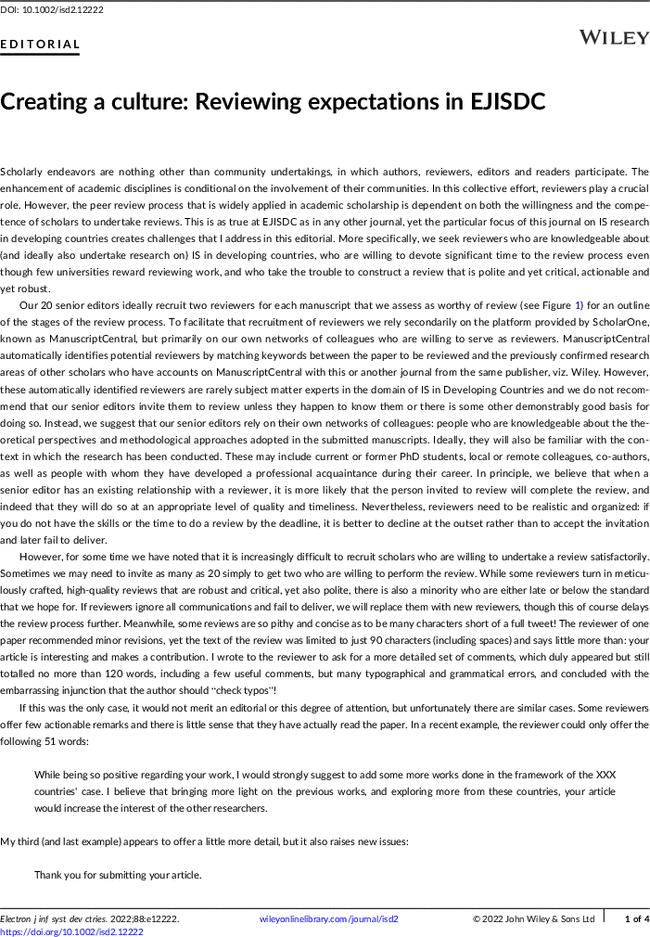Creating a culture: Reviewing expectations in EJISDC
IF 1.1
Q2 SOCIAL SCIENCES, INTERDISCIPLINARY
Electronic Journal of Information Systems in Developing Countries
Pub Date : 2022-04-17
DOI:10.1002/isd2.12222
引用次数: 0
Abstract
Scholarly endeavors are nothing other than community undertakings, in which authors, reviewers, editors and readers participate. The enhancement of academic disciplines is conditional on the involvement of their communities. In this collective effort, reviewers play a crucial role. However, the peer review process that is widely applied in academic scholarship is dependent on both the willingness and the competence of scholars to undertake reviews. This is as true at EJISDC as in any other journal, yet the particular focus of this journal on IS research in developing countries creates challenges that I address in this editorial. More specifically, we seek reviewers who are knowledgeable about (and ideally also undertake research on) IS in developing countries, who are willing to devote significant time to the review process even though few universities reward reviewing work, and who take the trouble to construct a review that is polite and yet critical, actionable and yet robust. Our 20 senior editors ideally recruit two reviewers for each manuscript that we assess as worthy of review (see Figure 1) for an outline of the stages of the review process. To facilitate that recruitment of reviewers we rely secondarily on the platform provided by ScholarOne, known as ManuscriptCentral, but primarily on our own networks of colleagues who are willing to serve as reviewers. ManuscriptCentral automatically identifies potential reviewers by matching keywords between the paper to be reviewed and the previously confirmed research areas of other scholars who have accounts on ManuscriptCentral with this or another journal from the same publisher, viz. Wiley. However, these automatically identified reviewers are rarely subject matter experts in the domain of IS in Developing Countries and we do not recommend that our senior editors invite them to review unless they happen to know them or there is some other demonstrably good basis for doing so. Instead, we suggest that our senior editors rely on their own networks of colleagues: people who are knowledgeable about the theoretical perspectives and methodological approaches adopted in the submitted manuscripts. Ideally, they will also be familiar with the context in which the research has been conducted. These may include current or former PhD students, local or remote colleagues, co-authors, as well as people with whom they have developed a professional acquaintance during their career. In principle, we believe that when a senior editor has an existing relationship with a reviewer, it is more likely that the person invited to review will complete the review, and indeed that they will do so at an appropriate level of quality and timeliness. Nevertheless, reviewers need to be realistic and organized: if you do not have the skills or the time to do a review by the deadline, it is better to decline at the outset rather than to accept the invitation and later fail to deliver. However, for some time we have noted that it is increasingly difficult to recruit scholars who are willing to undertake a review satisfactorily. Sometimes we may need to invite as many as 20 simply to get two who are willing to perform the review. While some reviewers turn in meticulously crafted, high-quality reviews that are robust and critical, yet also polite, there is also a minority who are either late or below the standard that we hope for. If reviewers ignore all communications and fail to deliver, we will replace them with new reviewers, though this of course delays the review process further. Meanwhile, some reviews are so pithy and concise as to be many characters short of a full tweet! The reviewer of one paper recommended minor revisions, yet the text of the review was limited to just 90 characters (including spaces) and says little more than: your article is interesting and makes a contribution. I wrote to the reviewer to ask for a more detailed set of comments, which duly appeared but still totalled no more than 120 words, including a few useful comments, but many typographical and grammatical errors, and concluded with the embarrassing injunction that the author should “check typos”! If this was the only case, it would not merit an editorial or this degree of attention, but unfortunately there are similar cases. Some reviewers offer few actionable remarks and there is little sense that they have actually read the paper. In a recent example, the reviewer could only offer the following 51 words:

创造一种文化:回顾EJISDC中的期望
本文章由计算机程序翻译,如有差异,请以英文原文为准。
求助全文
约1分钟内获得全文
求助全文
来源期刊

Electronic Journal of Information Systems in Developing Countries
SOCIAL SCIENCES, INTERDISCIPLINARY-
CiteScore
3.60
自引率
15.40%
发文量
51
 求助内容:
求助内容: 应助结果提醒方式:
应助结果提醒方式:


